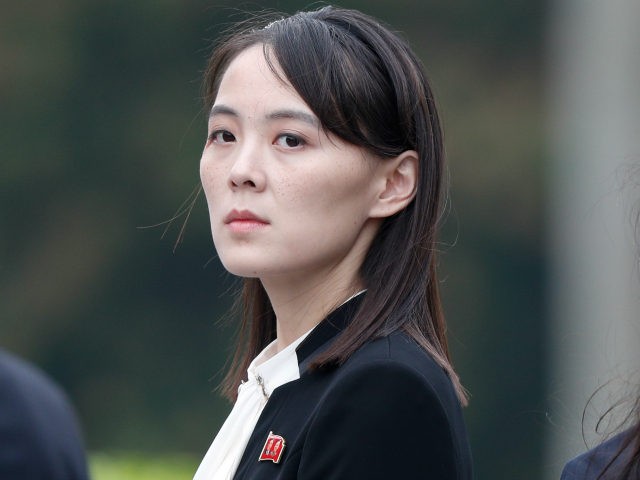Kim Yo-jong, a senior North Korean official and sister of dictator Kim Jong-un, published an outraged screed on Friday condemning the United Nations Security Council for addressing her country’s presumed intercontinental ballistic missile (ICBM) test this week, claiming America is driving Asia to “nuclear war.”
North Korea’s state media announced on Thursday that a missile test observed by neighbors South Korea and Japan was of the “Hwasong-18,” a new model ICBM using solid fuel. South Korean military officials reportedly believe the “Hwasong-18” could reach the entirety of the continental United States.
Prior to its launch, South Korean President Yoon Suk-yeol told attendees at the annual NATO summit in Lithuania that North Korea had the ability to attack “not only Vilnius but also Paris, Berlin, and London” with nuclear weapons.
The ICBM test followed threats earlier in the week out of Pyongyang that it would not hesitate to shoot down American aircraft invading its airspace, claiming Washington had sent “spy” planes into North Korea and objecting to the arrival, in June, of an American nuclear-powered submarine to Busan, South Korea. The USS Michigan‘s stationing in the southern port city was a result of agreements signed between Yoon and American leftist President Joe Biden in April during Yoon’s official state visit to Washington.
Biden agreed to station a nuclear submarine in South Korea for the first time since 1981 after Yoon and several members of his conservative People Power Party began publicly suggesting South Korea could launch its own nuclear weapons program, which polls have shown the majority of South Koreans would support.
Kim Yo-jong in her statement on Friday blamed Biden for turning nuclear war into a “miserable reality” for the Korean peninsula.
“To thoroughly contain and frustrate the most hostile and threatening nuclear confrontation policy of the U.S. against the DPRK [North Korea] is the just right to self-defence,” Kim Yo-jong asserted, “and no one has any justification for slandering the DPRK’s launch of new-type ICBM.”
“Due to the aggressive provocations of the U.S. far beyond its constant military readiness, the situation of the Korean peninsula is now heading toward the threshold of nuclear clash,” she continued, “and the outbreak of a nuclear war is not hypothetical but is becoming a miserable reality that countries in the Northeast Asian region have to face in the near future.”
“The price the U.S. has to pay for its moves against the DPRK will never be low, and I do not conceal the fact that very unlucky things will wait for the U.S.,” the dictator’s sister predicted.
The main objective of Kim Yo-jong’s statement was to condemn the Security Council for holding a meeting on Thursday to address and condemn the presumed ICBM launch. Kim insisted the missile launch was “conducted in the safest way” and “did not do any harm to international maritime and air security” and, therefore, should not be the subject of Security Council scrutiny.
“I express strong displeasure over and scathingly condemn the unfair and prejudiced behavior of the UNSC [Security Council] which again called into question the DPRK’s exercise of its just right to self-defence,” Kim wrote, “which did not hurt anyone, under the unchanged and boring illegal pretext of violation of the UN ‘resolution.'”
“If an undesirable, unprecedented nuclear war breaks out in the Korean peninsula, the UNSC will be held accountable for it,” Kim Yo-jong promised.
North Korea’s envoy to the United Nations made a rare appearance at the Security Council meeting on Thursday to defend the missile launch in similar terms, claiming that it did not pose a security threat to the country’s neighbors and was necessary as a result of closer military cooperation between Washington and Seoul. Kim Song, the representative, told the Council that the launch occurred as part of “a legitimate right of a sovereign State which nobody can deny as it is recognized under the United Nations Charter and international law.”
Kim denounced the entire meeting as a “contradictory act that denies the fundamental principles of sovereign equality and non-interference in internal affairs” and demanded the Security Council, instead, hold meetings on America’s alleged “aerial espionage acts” and allegedly “anti-peace behavior.”
“How can the deployment of nuclear assets, joint military exercises and aerial espionage acts by the United States contribute to peace and stability on the Korean Peninsula?” the envoy reportedly asked.
With the exception of China and Russia, the North Korean representative received little support at the Council. Aside from a general call for “dialogue,” U.N. Assistant Secretary-General for Middle East, Asia, and the Pacific Khaled Khiari condemned the development of advanced missiles that may be able to hold nuclear payloads as a global security threat. Khiari predicted that the Hwasong-18 “can reach most points on Earth,” greatly expanding Pyongyang’s threat to the world.
South Korean U.N. envoy Hwang Joonkook added the context that North Korea had “launched more than 90 ballistic missiles, including 13 long-range ones,” in 2023, a year Kim Jong-un welcomed by calling for an “exponential increase” in the number of nuclear weapons his country possesses. Contrary to Kim, the U.N. representative, condemning the Council for addressing the threat from his country, Hwang complained that the Security Council was “paralyzed” by North Korean support from China and Russia.
“It is deeply troubling that the Council meets repeatedly without any concrete result … while Pyongyang profits massively by continuing to evade sanctions and exploit key loopholes through malicious cyberactivities, overseas laborers and illicit ship-to-ship transfers of refined petroleum products and coal,” Hwang said.

COMMENTS
Please let us know if you're having issues with commenting.